Thesis Chapters by Sean McKinnon
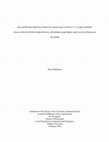
The Spanish language is in contact with many languages throughout the world, from minority region... more The Spanish language is in contact with many languages throughout the world, from minority regional languages in the Iberian Peninsula to indigenous languages throughout Latin America. Despite the volume of research on Spanish in contact with other languages, many previous studies have not adequately engaged with the theoretical contact literature, in terms of accounting for relevant social factors that affect variation in situations of language contact. This is to say, much of the previous research has been concerned with linguistic innovation in trying to demonstrate that the origin of a particular variant was contact-induced, at the expense of determining which social factors propagate language change in bilingual speech communities.
This dissertation examines the propagation of contact-induced language changes with the Spanish stops /p, t, k, b, d, g/ in a bilingual speech community in Guatemala. Thirty-six bilingual Spanish-Kaqchikel Maya speakers completed a sociolinguistic interview and two questionnaires (i.e., a modified version of the Bilingual Language Profile [Birdsong, Gertken & Amengual, 2012] and the newly created language contact social network survey) that aimed to quantify three important social factors in language contact situations: 1) social network structure; 2) language ideology/attitudes; 3) degree of bilingualism. Tokens of the Spanish stops were extracted and measured for voice onset time (for the voiceless stops) and the consonant-vowel intensity ratio (for the voiced stops). These tokens were submitted for statistical analyses to examine the linguistic and social factors that affected the observed variation.
The results showed that the mean VOT values for the voiceless stops were between what has been previously reported for monolingual Guatemalan Spanish and Kaqchikel Maya. With respect to the voiced stops, the mean CV intensity ratio values for the bilingual Kaqchikel- Spanish community was lower (i.e., more constriction) than what has been reported for monolingual varieties of Spanish. Results from multivariate analyses revealed that biological sex, age, language history, language proficiency, language attitudes, weekly language use, community integration, and social integration were all significant factors in accounting for the linguistic variation. Therefore, this dissertation contributes to the field by uncovering the complexity of how social factors relevant to situations of language contact work in tandem to affect the propagation of linguistic variation in bilingual speech communities.
Papers by Sean McKinnon
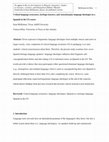
Recent developments in Hispanic Linguistics: Studies in structure, variation, and bilingualism
Given exposure to hegemonic language ideologies from multiple sources and actors in larger societ... more Given exposure to hegemonic language ideologies from multiple sources and actors in larger society, a key component of critical language awareness (CLA) pedagogy is to raise students' critical consciousness about them. Therefore, the present study examines how seven Spanish heritage language speakers' language ideologies influence their linguistic self-conceptualization before and after taking a CLA-informed course on Spanish in the US. The results provide evidence that most students either questioned dominant language ideologies (e.g., monoglossic and standard language) when it came to conceptualizing their own Spanish or directly challenged them in their daily lives after completing the course. However, some participant reflections expressed hegemonic language ideologies at the end of the semester, which mirrors findings from previous research that measure students' critical awareness post-instruction.
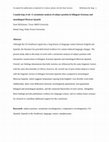
Spanish in Context
Although the US Southwest region has a long history of language contact between English and Spani... more Although the US Southwest region has a long history of language contact between English and Spanish, the literature has provided mixed evidence for contact-induced language changes. The present study adds to this body of work with a variationist analysis of subject position with intransitive constructions in bilingual Arizonan Spanish and monolingual Mexican Spanish. Overall, our findings demonstrate that both varieties are influenced by the same linguistic factors with the same directionality of effects; however, the overall rate of post-verbal subjects is lower with the linguistic factors in bilingual Arizonan Spanish when compared to monolingual Mexican Spanish, which suggests frequential copying from English's less flexible word order. Additionally, there were differences between sociolinguistic generations, first generation bilingual and monolingual speakers, and the constraint hierarchies of each variety. Altogether, these findings provide preliminary evidence for language contact, and we outline future avenues for research to contribute additional support for this conclusion.

Studies in Hispanic and Lusophone Linguistics, 2023
En situaciones de contacto intenso entre dos comunidades lingüísticas, es probable que surjan var... more En situaciones de contacto intenso entre dos comunidades lingüísticas, es probable que surjan varios cambios lingüísticos debido al contacto. Este estudio expande la investigación del español en contacto con el maya kaqchikel mediante la examinación de la glotalización de las vocales iniciales de palabra, un fenómeno que ocurre obligatoriamente en kaqchikel. Empleando la sociolingüística comparativa, se investigaron no solo los factores lingüísticos y extralingüísticos que influyen la cantidad de glotalización (i.e., presencia de una oclusivas glotal sorda o voz rechinada), pero también su calidad (i.e., porcentaje de glotalización presente en el segmento). Los resultados indican que hay diferencias significativas entre los hablantes bilingües y monolingües, ya que los bilingües tienen una tasa de glotalización más alta; además, la separación de los datos monolingües de los bilingües revela que la glotalización de las vocales iniciales es estable en la comunidad bilingüe, pero hay un cambio en progreso en la población monolingüe. Aparte de analizar los hallazgos en el contexto socioecológico de Guatemala, también se contrastan con otras dos situaciones de contacto (i.e., Paraguay y el Yucatán) para examinar el efecto del nivel de bilingüismo en la sociedad con respecto a la tasa de glotalización.
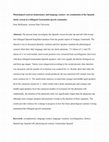
Linguistic Advances in Central American Spanish, 2023
The present study investigates the Spanish voiced alveolar tap and trill with twenty four bilingu... more The present study investigates the Spanish voiced alveolar tap and trill with twenty four bilingual Spanish-Kaqchikel speakers from the greater region of Antigua, Guatemala. The objective was to document phonetic variation and how speakers maintain the phonological contrast when their other language only has one rhotic phoneme. 713 tokens of /ɾ/ and 276 tokens of /r/ in word-medial, intervocalic position were extracted from sociolinguistic interviews with these bilingual Guatemalan Spanish speakers, who were equally divided by biological sex and three age ranges. Tokens were categorized according to the variant present, their duration was measured, and the number of occlusions was counted (for /r/). Results show that while the canonical tap was the most common variant produced, the non-canonical trill variants were the most common for /r/. The multivariate analyses revealed that younger and middle-aged speakers favor the canonical variant for /ɾ/, while words with a rhotic minimal pair and younger and middle-aged speakers favor the canonical number of occlusions for the phonemic trill. Additionally, the duration of the phonemic trills was significantly longer than the phonemic tap, although some younger speakers had potential overlap in the duration of these segments. The results provide evidence for a change in progress in how the rhotic phonological contrast is being maintained this bilingual speech community.

Spanish in Context, 2020
El estudio empírico de la sociofonética del español en contacto con otras lenguas ha aumentado... more El estudio empírico de la sociofonética del español en contacto con otras lenguas ha aumentado en la última década. Siguiendo con este área de investigación, el presente estudio examina la aspiración de las oclusivas sordas en el español guatemalteco comparando los factores (extra- )lingüísticos que afectan a la variación en las comunidades monolingües y bilingües (español- kaqchikel), mediante el marco teórico de la sociolingüística comparativa (Poplack y Levey 2010). Los resultados demuestran que, en general, el VOT de esta muestra del español guatemalteco es más largo de lo que se ha descubierto para las variedades sin contacto, pero es paralelo al español en contacto con el maya yucateco (Michnowicz y Carpenter 2013). Aunque, mayoritariamente, los factores lingüísticos afectaron a la variación del VOT, el sexo biológico también resultó relevante. Se discutirán tres puntos clave que señalan la posibilidad de contacto lingüístico como causa, pero se necesitan investigaciones futuras para confirmar definitivamente los efectos del contacto.
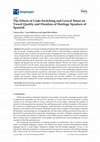
Languages, 2017
The quantity of research on Heritage Speakers (HS) of Spanish phonetics has increased over the la... more The quantity of research on Heritage Speakers (HS) of Spanish phonetics has increased over the last decade, including studies on the possible effect of code‐switching on Spanish phonetics. Following this line of research, the present study investigates the role of code‐switching and lexical stress on Spanish HS vowel production, specifically if the introduction of English reduces the vowel quality and duration of Spanish vowels after a code‐switch. Eleven Spanish HSs participated in a controlled narration task in which they were asked to read aloud texts that code‐switched between English and Spanish and one text that only contained Spanish. PRAAT was used to segment the vowels and the F1 and F2 values, along with duration, were extracted. The results show that both code‐switching and lexical stress significantly affect Spanish HS vowels. Code‐switching and vowels in unstressed position were more centralized than the vowels in the monolingual Spanish session and vowels in stressed position, respectively; unstressed vowels were also shorter in duration than stressed vowels. These results show that the introduction of English—a language in which vowel quality and duration change between unstressed and stressed syllables—via code‐switching significantly affects Spanish HS vowels, subsequently providing evidence for transient interference.
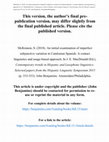
Contemporary trends in Hispanic and Lusophone Linguistics: Selected Papers from the Hispanic Linguistic Symposium 2015, 2018
While most Romance languages have only one morphological form for the imperfect subjunctive, Span... more While most Romance languages have only one morphological form for the imperfect subjunctive, Spanish exhibits variation between two morphological paradigms: -ra and –se. The present study investigated the distribution of these forms according to linguistic factors in Catalonian Spanish, a variety in close contact with Catalan. A corpus of 1,075 imperfect subjunctive tokens was compiled from the letters to the editor section of the regional newspaper La Vanguardia. Results show that the overall distribution of –se is slightly higher than what has been reported for European Spanish. Furthermore, a multivariate analysis revealed that structural priming, the existence of a cognate verb in Catalan and the combination of local frequency and morphological irregularity in the imperfect subjective significantly favor the use of –se.

Journal of Language and Sexuality, May 2017
Although queer linguistics has long acknowledged the playful use of potentially impolite
utteranc... more Although queer linguistics has long acknowledged the playful use of potentially impolite
utterances by LGBT people to build in-group solidarity these practices have not been analyzed from a sociopragmatic approach, nor have they been mentioned in the general pragmatics literature. Responding to these two gaps, the present study examines the functional use of the interactional practice ‘reading’ in the backstage talk of four drag queen performers. By employing a mock impoliteness analytical framework (Haugh & Bousfield 2012) this study shows how these utterances, which could potentially be evaluated as genuine impoliteness outside of the appropriate context, are positively evaluated by in-group members who recognize the importance of “building a thick skin” to face a hostile environment from LGBT and non- LGBT peoples. This study also seeks to draw attention to the use of backstage talk, and supplemental interview data, to uncover drag queen cultural practices through language use.
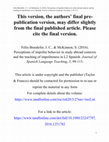
Journal of Spanish Language Teaching, 2016
The present study investigates the way in which second-language Spanish learners conceptualize im... more The present study investigates the way in which second-language Spanish learners conceptualize impolite behavior in intercultural interactions while abroad. The data were collected through a prompt that asks participants to write a narration of an impolite situation that occurred while they were studying abroad in Spain or Latin America. Fifty impoliteness events were analyzed for perceived offense type. The results show that learners perceived greater offense to their “quality face” and “social identity face.” Sociocultural and linguistic competence characteristics with respect to the perceived offenses are then discussed. As a result of the analysis, this study concludes with pedagogical recommendations for the teaching of impoliteness in the classroom.
Co-authored with J. César Félix-Brasdefer.
Link is to download one of the author's free 50 e-copies of the article, if interested.
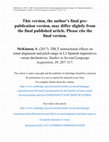
Studies in Second Language Acquisition, 2017
The present study investigates the prosody/pragmatics interface in TBLT by extending the traditio... more The present study investigates the prosody/pragmatics interface in TBLT by extending the traditional morphological focus-on-form to a focus on intonational forms, with Spanish declaratives and imperatives. Twenty-eight intermediate L2 Spanish learners were assigned to one of two conditions that differed in the type of focus-on-form present during the pre- and posttask phases of a focused, task-based intervention: focus on grammar (FOG) or focus on grammar + intonation (FOG + I). All participants were administered an oral discourse completion task in a pre- and a posttest that elicited Spanish imperatives and declaratives to measure gains. Results show that participants, regardless of condition, did not distinguish imperatives from declaratives using intonation in the pretest. However, participants in the FOG + I condition modified their pitch range and pitch accents in the posttest to signal a difference between imperatives and declaratives, though their use was different from the input provided by a native speaker instructor.

Journal of Politeness Research, Jul 2014
Within the impoliteness literature, an important distinction has been made between genuine and mo... more Within the impoliteness literature, an important distinction has been made between genuine and mock (or non-genuine) impoliteness (Culpeper 1996, 2011; Bernal 2008, among others). Even though mock impoliteness has generally been analyzed within an impoliteness framework, recent proposals suggest that it is an essentially different pragmatic phenomenon that requires a continuous conversational evaluation (Haugh and Bousfield 2012). The present study had the goal of assessing the offline evaluation process of target genuine vs. mock impoliteness utterances, specifically the role the situational/ discourse contexts, as well as prosodic and gestural patterns, play in their interpretation. A total of 97 participants were either asked to rate the degree of impoliteness of target genuine and mock impoliteness utterances in isolation (Experiment 1), or to rate the same utterances preceded with a set of matched and mismatched situational/discourse contexts which favored either a genuine or a mock impoliteness interpretation (Experiment 2). The results of the two experiments show that (a) evaluations of intended mock impoliteness utterances generate more uncertainty in listeners than intended genuine impolite utterances; and (b) mock impoliteness evaluations are characterized by a more active use of gestural cues. These results provide evidence that mock impoliteness triggers a more complex evaluation procedure of a phenomenon that lies on the boundary between polite and impolite behavior.
This senior honors thesis looks at intervocalic /s/ voicing in Catalonian Spanish as a product of... more This senior honors thesis looks at intervocalic /s/ voicing in Catalonian Spanish as a product of contact-induced change and seeks to describe the linguistic and sociolinguistic factors that favor the voicing of /s/. Furthermore, this paper will argue that /s/ voicing is not a byproduct of the Spanish brought to Catalonia by the Castilians, but rather the imposition of a specific Catalan phonological rule onto the bilingual’s spoken Spanish. Finally, the results will support other findings and principles guiding /s/ voicing in Spanish, particularly in regards to the current research being done on Ecuadorian Spanish.
Conference Presentations by Sean McKinnon
A Needs Analysis collaboration between several IU graduate students (Meg Cychosz, Jordan Garrett,... more A Needs Analysis collaboration between several IU graduate students (Meg Cychosz, Jordan Garrett, Carly Henderson,
Sean McKinnon and Ángel Milla Muñoz)

Uploads
Thesis Chapters by Sean McKinnon
This dissertation examines the propagation of contact-induced language changes with the Spanish stops /p, t, k, b, d, g/ in a bilingual speech community in Guatemala. Thirty-six bilingual Spanish-Kaqchikel Maya speakers completed a sociolinguistic interview and two questionnaires (i.e., a modified version of the Bilingual Language Profile [Birdsong, Gertken & Amengual, 2012] and the newly created language contact social network survey) that aimed to quantify three important social factors in language contact situations: 1) social network structure; 2) language ideology/attitudes; 3) degree of bilingualism. Tokens of the Spanish stops were extracted and measured for voice onset time (for the voiceless stops) and the consonant-vowel intensity ratio (for the voiced stops). These tokens were submitted for statistical analyses to examine the linguistic and social factors that affected the observed variation.
The results showed that the mean VOT values for the voiceless stops were between what has been previously reported for monolingual Guatemalan Spanish and Kaqchikel Maya. With respect to the voiced stops, the mean CV intensity ratio values for the bilingual Kaqchikel- Spanish community was lower (i.e., more constriction) than what has been reported for monolingual varieties of Spanish. Results from multivariate analyses revealed that biological sex, age, language history, language proficiency, language attitudes, weekly language use, community integration, and social integration were all significant factors in accounting for the linguistic variation. Therefore, this dissertation contributes to the field by uncovering the complexity of how social factors relevant to situations of language contact work in tandem to affect the propagation of linguistic variation in bilingual speech communities.
Papers by Sean McKinnon
utterances by LGBT people to build in-group solidarity these practices have not been analyzed from a sociopragmatic approach, nor have they been mentioned in the general pragmatics literature. Responding to these two gaps, the present study examines the functional use of the interactional practice ‘reading’ in the backstage talk of four drag queen performers. By employing a mock impoliteness analytical framework (Haugh & Bousfield 2012) this study shows how these utterances, which could potentially be evaluated as genuine impoliteness outside of the appropriate context, are positively evaluated by in-group members who recognize the importance of “building a thick skin” to face a hostile environment from LGBT and non- LGBT peoples. This study also seeks to draw attention to the use of backstage talk, and supplemental interview data, to uncover drag queen cultural practices through language use.
Co-authored with J. César Félix-Brasdefer.
Link is to download one of the author's free 50 e-copies of the article, if interested.
Conference Presentations by Sean McKinnon
Sean McKinnon and Ángel Milla Muñoz)
This dissertation examines the propagation of contact-induced language changes with the Spanish stops /p, t, k, b, d, g/ in a bilingual speech community in Guatemala. Thirty-six bilingual Spanish-Kaqchikel Maya speakers completed a sociolinguistic interview and two questionnaires (i.e., a modified version of the Bilingual Language Profile [Birdsong, Gertken & Amengual, 2012] and the newly created language contact social network survey) that aimed to quantify three important social factors in language contact situations: 1) social network structure; 2) language ideology/attitudes; 3) degree of bilingualism. Tokens of the Spanish stops were extracted and measured for voice onset time (for the voiceless stops) and the consonant-vowel intensity ratio (for the voiced stops). These tokens were submitted for statistical analyses to examine the linguistic and social factors that affected the observed variation.
The results showed that the mean VOT values for the voiceless stops were between what has been previously reported for monolingual Guatemalan Spanish and Kaqchikel Maya. With respect to the voiced stops, the mean CV intensity ratio values for the bilingual Kaqchikel- Spanish community was lower (i.e., more constriction) than what has been reported for monolingual varieties of Spanish. Results from multivariate analyses revealed that biological sex, age, language history, language proficiency, language attitudes, weekly language use, community integration, and social integration were all significant factors in accounting for the linguistic variation. Therefore, this dissertation contributes to the field by uncovering the complexity of how social factors relevant to situations of language contact work in tandem to affect the propagation of linguistic variation in bilingual speech communities.
utterances by LGBT people to build in-group solidarity these practices have not been analyzed from a sociopragmatic approach, nor have they been mentioned in the general pragmatics literature. Responding to these two gaps, the present study examines the functional use of the interactional practice ‘reading’ in the backstage talk of four drag queen performers. By employing a mock impoliteness analytical framework (Haugh & Bousfield 2012) this study shows how these utterances, which could potentially be evaluated as genuine impoliteness outside of the appropriate context, are positively evaluated by in-group members who recognize the importance of “building a thick skin” to face a hostile environment from LGBT and non- LGBT peoples. This study also seeks to draw attention to the use of backstage talk, and supplemental interview data, to uncover drag queen cultural practices through language use.
Co-authored with J. César Félix-Brasdefer.
Link is to download one of the author's free 50 e-copies of the article, if interested.
Sean McKinnon and Ángel Milla Muñoz)